- Home
- S. A. Barton
The Always-House People Page 2
The Always-House People Read online
Page 2
***~~~***
Ba'el woke the next morning in a daze. His head swam with half-remembered dreams, thoughts of Gods, and formless fears out of childhood. Not since the fever that nearly took him in his fourth summer had he felt so unreal, like a ghost in his own body. He set off stiff-legged and clumsy to find Ak'ken, ignoring the meaty antelope shin and berries Isk had left for him. He found Ak'ken out past the rows of plants and their tenders. Ak’ken was peeing over a staked-out hyena hide for two waiting women to work and soften. Two young boys watched, then peed after him where he pointed, wetting the dry places. Ba'el stalked up to Ak'ken and demanded, “Why have you forsaken the Gods?”
Suddenly, Ba'el was fully awake, the ghost feeling gone. He stared at the earth an inch from his nose, at the tiny black ants climbing over the blades of grass. He spat blood on the ants. Ba'el had struck him. Not with the fist as a man strikes a man, but a slap with the back of the hand as a man strikes a boy. Ba'el stood slowly, facing to one side of Ak';en, looking at him from the corner of his eye. To face him now would be to challenge him.
“I was mad with dreams, Ak'ken. But Isk told me, and I want to know.”
“I have not told Isk. I will not tell you. I cannot tell anyone what not to believe.” The old man was grinning through his beard. Grinning! Ba'el balled his fists, but still did not face Ak'ken with his eyes.
“This place is a wrongness,” Ba'el said quietly. “It is against the teachings.”
“Did Isk tell you how we are punished?”
Ba'el looked down at the grass. In a whisper: “More of your children live.”
“A strange punishment. You should think on it.” Ak'ken stepped forward, turned Ba'el gently to face him with fingertips on shoulder. There was no force in it, but Ba'el turned.
“Instead of thinking now, though, you should help me. Come along. It is a short walk.” Ba'el followed Ak'ken along a well-worn path through tall grasses and low trees to the edge of a broad, slow creek. They both stood and watched it for awhile, waiting to see if the eyes of crocodiles disturbed the surface. There was no sign. They walked to one side and quickly came to a place where the waters broadened to twice their original width. The banks looked chewed, as if some great earth-eating beast had dined there. Bits of dry brown grass stalks littered the well-trampled banks. Nearby in a sunny clearing sat many hands of the large mud and grass cubes.
“Take one,” said Ak'ken, picking one up himself and setting it under his ropy-muscled arm. Ba'el obeyed. Grains of sand came loose from the surface and fell back onto the ground, but only a few. The cube was hard and dry. Ba'el's arm was too short to settle the bulky thing high near his armpit like Ak'ken, so he held it low like a woman carries a baby, sticking a hip out under it. Together they walked to the edge of the village, near the rows of plants. Ak'ken set his block down, then paced away from it, the ceremonial five steps that make a bachelor's house. He pointed at the round in front of his feet.
“Put your brick there,” he said, using an unfamiliar word. The meaning was clear, though. Ba'el stepped forward, met Ak'ken's eyes, then bent and placed the brick. The ritual was unfamiliar in detail, but not in general.
“This house is yours, and you are of us while you stay. May you choose to remain.”
So between the blocks Ba'el built his house, in the old style with poles and skins and thatch. He dug the poles in deep like his people did when the rainy season came even though there was no rain yet. Already, he thought, I am planning to stay before I have decided if it is smart. The thought worried him, but he could think of nothing to do for his worry so instead he worked and built a strong house.
The next morning he asked Ak'ken about the secret of the water-walking log. Ak'ken sent him to Ut-pah, who was almost as old as Ak'ken and almost as strong. Every day he went to Ut-pah, at first afraid of the magic logs, then only wary as Ut-pah showed him how to use them. Once he saw they were only plain wood chopped into shape with hand-ax and scraper and not magic at all, he was excited to float in them, and to help carve them out, and to walk out through the woods with Ut-pah banging the trees hard with heavy sticks to find strong and sound ones. They made three of the water-logs before the rains came, and the cool winds. Ba'el knew with their coming his people, the Goat People, were taking down their houses and walking south. He thought of his father Ikkel and wondered if anyone would take his burden so he could rest the foot broken by an Ibex's hoof three turns of the seasons ago. He wished he could talk to his father, bring him to the always-house. But he knew what his father would say: walk and please the Gods.
So he stayed as the rains grew more frequent. He went out to hunt game with Ak'ken, and dug great yams as thick as a man's leg from the fields with Isk. He brought wood to Ut-pah which the older man carved into dolls for the children. Around the middle of the rain season, he brought the woodcarver a succulent crocodile tail as an asking-gift, and asked to court his daughter Masi. Among the Goat People Masi would have been driven out as cursed by the Gods because of her obvious rodent-lip. But Ba'el could see she was strong and clever and diligent. He wondered if he would have seen those traits before coming to Ak'ken and his people, or if he would only have seen the so-called curse. Soon Masi was living in Ba'el's house, and by the time the rains came again they had built it into a larger house, laid the blocks to make it an always-house, and made a daughter to share it with them, Yasi. Ak'ken united them before the Always-House People with the always-words, so all could hear that Ba'el and Masi were part of each other as much as their own arms and legs and bellies were. Ba'el no longer thought of the Goat People at all except alone late in the night, in dreams of endless walking. The Gods followed behind them all with spears, wearing masks flayed from the faces of dead children, along with living priests who walked beside them, skull-faced and leaving a trail of bloody tears behind them all.
The seasons turned yet again and the hot season returned before the Goat People came in the night. They came by stealth, killing the watchers quietly with spears before the mass of them came up with clubs into the always-houses, dragging the bodies of sleepers out into the common ground. Two men who Ba'el had played with when they were all boys tied him tightly in an antelope hide and dragged him out, propping him against a tree to watch. They laid little Yasi at his feet, her forehead smashed open and her brains leaking into the dirt. He saw a few of the Always-House People escape into the night, naked and carrying nothing. Cries of blasphemer and heretic followed them, but no Goat People did.
They were too busy destroying.
In the morning the men who had dragged him from sleep beat him with their fists and feet, then held him against a thorn tree while he was stunned. A woman wrapped him tightly to it with the fresh guts of goats. The long thorns dug deeply into his limbs. Yasi and Ak'ken they hung, dead, from branches to either side. He cried out but nobody would hear him. He saw his father Ikkel but the older man would not look at him. For three days, the Goat People took apart the always-houses, carrying the dry mud blocks to the river and throwing them in, until nothing remained but sticks and dirt and scraps of roof-thatch. When the Goat People ate, one of them would pour a skin of water over Ba'el's head and let him lap at it like a dog. They gave him no food. At dusk of the third day the destruction was done and Ikkel stood before his son.
Ba'el opened his cracked and parched lips and croaked, “Father...” and Ikkel slapped him. Ba'el opened his mouth again and the slap came before a sound came forth. A third time Ba'el tried to speak, and the slap knocked a tooth into the dirt. Ba'el hung his head. His blood fell to the earth, quiet, like the beat of a drum far off, pat-pat-pat.
Then Ikkel spoke. “I do not have a son Ba'el. But Ba'el was once my son. The Gods showed me my once-uncle Ak'ken and my once-son Ba'el together mocking the Gods here in this place, refusing to live as the Gods command. The Gods showed me this place to destroy it. They chose me to bring their wrath. They showed
me one more thing.” Ikkel opened his hand, the one he had not slapped with. He showed Ba'el the razor-sharp flake of flint there, resting in the callused palm framed in little white lines where it had bitten the skin. “They showed me how to make Ba'el my son again, how to restore him to the Goat People, how to bring him to the Gods again.” He picked the flint from his palm between the first two fingers and thumb of his slapping hand and placed his other hand over Ba'el's mouth. His fingers and thumb tightened over Ba'el's cheekbones so hard that they creaked with strain, the sound loud inside his own head. The dirty brown blur of fingers filled his sight and then the utter darkness of a deep cave closed over him. He felt the water of his eyes dribble down his cheeks and tasted of its saltiness before the pain came and filled the world so full there was no room for anything else.
Time passed, a nearly orderless sea of impression. At first the world was hot, unbearably hot. Sometimes there was water poured over him, sometimes his body was placed in the water, never did it bring relief. Lights appeared to him, dim and smoky, sometimes bright and piercing, but their shapes were never clear. When he tried to open his eyes to see more a pain seized his head like a great bear and he felt it try to tear his spine out, straight up, by sheer strength. Voices came and went, some impossible ones like Masi and Yasi and Ak'ken, others not. One was a deep and stony voice that always spoke of the Gods, their mercy and their wrath. That one called itself Sivven. After a time he realized the one that brought water to drink and chewed food for him as if he were an infant was Isk, his friend.
As soon as he was strong enough for sense to return, perhaps days, perhaps weeks, he asked, “Isk, where are Masi and Yasi?” There was a silence, a shifting of human weight on dirt, then fingers brought him another mouthful of chewed yam.
“They are dead, Ba'el. You saw.”
“I did. I heard them after. I could not tell if it was fever or if...”
“The Gods gave you the mercy of hearing their voices one last time is what if,” interrupted Sivven's voice. “I do not know why. Their mercy is beyond me. You turned away from the Goat People and all the Gods who watch over us. I watch this out-clan boy serve you like a woman and I wonder how else you have dishonored the Gods.” There was the sound of a brief scuffle. A foot kicked down on Ba'el's forehead weakly, as if by accident, and he lurched aside with all of his frail strength, rolling onto his shoulder away from the blow. He heard Isk gasp, and Sivven rasp, “Your hamstrung leg? Bad luck, boy.” Knees thumped to the earth behind him, at the middle of his back, just touching his skin. He could not find the strength to move again. “You are strong enough to feed yourself now, Ba'el. You do not need your clanless maidservant.” There was a liquid gargle, then a series of breathy gasps, growing fainter, each throwing a splatter of hot wetness, of hot stinking blood, over Ba'el's back and side. At length, the weight of Isk's twitching corpse landed over his hip. “You will join him, child. Unless you learn to love the Gods again. Think on it.” Sivven's footsteps receded.
Ba'el lay alone in the dark of his ruined eyes. He listened to the flies come, first one, then many, then a great swarm. They crawled over his skin in droves, feeding on the clotted stink of blood that soaked him. Slowly, painfully, he rose to his hands and knees and began to feel around himself. Isk's corpse rolled off of his hip in a sudden roaring of flies. When he found the bowl of yams his fingers, caked with bloody dirt and his friend's death shit, polluted them. He threw the bowl from himself and heard it thump a hollow empty sound against the skin walls. Hunger and thirst rose in him as the hours passed and he crawled around the perimeter of the hut, feeling for a way under the skins and out. They were staked tight. Once he found a gap and a foot stamped down on his fingers; soon a hammerstone drove against a stake and the way was gone.
He slept, and when he woke his tongue was cracked and dry. The sweet-sick stench of rotting meat clung to him like a sticky, slimy animal and he wondered how long he had been asleep. He panted like a dog in the heat of the house. Eventually, the flap door opened again. Something thumped to the ground before him and he recoiled, fearing it was the corpse of another friend. He heard the gurgle of water and lurched back toward it. He could smell the clean moisture. Before he could reach it, A rough skin moccasin struck his face and he fell to his back. The salt of his blood stung his dry lips.
“By the mercy of Chael, father of all Gods,” Sivven's voice ground out, sternly. Ba'el crawled toward the water again, not understanding, desperate, so intent even the endless droning of flies faded from his hearing. The moccasin came again, and more blood. “By the mercy of Chael, father of all Gods!” Ba'el reached again. The moccasin beat him back a third time.
Clothing-skins rustled as Sivven bent, water gurgled as the old man picked the waterskin from the stinking floor. “You will learn, boy, to thank the Gods properly before you drink.” The moccasins retreated, leaving Ba'el alone with his thirst again-- and the flies. His flies. Had they always been with him? It seemed so, though he knew it was not true. He lapped at the blood that ran from his nose, softening his parched tongue, until it clotted and stopped. Consuming himself. The thoughts stuck in the dark, in the chamber of his torture. Consuming himself. His flies. More time passed and his tongue grew leathery and dry again. He slept, woke, slept, woke... slept? How many times? He had no idea. The flies' droning filled the world. Time flowed like honey, like dreams, like thick pine-pitch. The flies began to speak, first in words he did not know, then, more and more, in words and voices he did. The meaning emerged from the constant buzzing like waves from an endless sea. In waking and in dreams, unsure and then uncaring of which was which, many, many voices came. His father and mother, Ak'ken and Isk, Ba'el and Sivven. They bid him farewell from the Dead Lands, and they bid him welcome. He walked astride waking and dream, dead and alive, God and man, in both realms at once through the voice of the flies.
Sivven came again with water and Ba'el was standing, somehow not shaking with weakness, a thin and brittle strength in his limbs, waiting, and he snatched the skin from the old man's hand before he could speak, for a moment moving as surely as if his sight had returned.
“Do not tell me of Chael, old man, for he has spoken to me and not you. I have heard his holy command.” His lips and tongue ached with each movement as he spoke. The pain seemed far away, as in a dream, and he did not trouble himself with it or let it hamper him. Blood ran from deep cracks in his lips and he felt it drip onto his chest, flow into his mouth. He tasted his own blood again, consuming himself, and he raised the waterskin. Water and blood mingled in his mouth, and he paused, cheeks bulging, tasting the salt. Holy! Holy, or else what has this suffering been for? He swallowed. Ba'el heard Sivven's breaths come hard and fast, but the older man said nothing. After half of the skin's contents had wet his throat, Ba'el continued. “Take my hand and lead me to the people. I must tell them how the Gods spoke through the flies to warn us of the plague of the Always-House People and their ways.”
Sivven, still silent, led him. For many years after that day, Sivven led him where he asked, whenever he asked. Ba'el spoke often and well to many hands of hands of clans over many hands of hands of years. He and Sivven drilled many hands of hands of children with the words Chael brought through the flies until they could speak of the will of the Gods without error. And from that day forward there was not one village that lasted a single turn of the seasons before it was torn apart by those Ba'el touched, and those touched by those Ba'el had touched, not one village on Earth for fifty thousand years, until the people began again to forget the true path of the Gods.
Thank you for reading books on Archive.BookFrom.Net
Share this book with friends

 Maiden Flight
Maiden Flight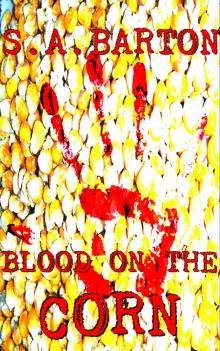 Blood on the Corn
Blood on the Corn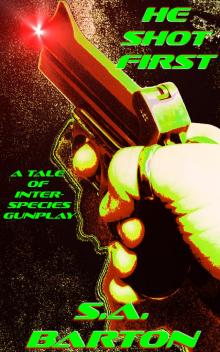 He Shot First
He Shot First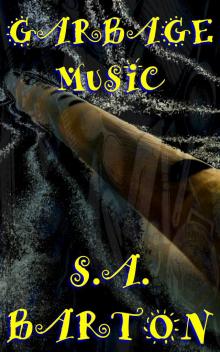 Garbage Music
Garbage Music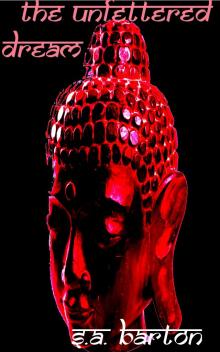 The Unfettered Dream
The Unfettered Dream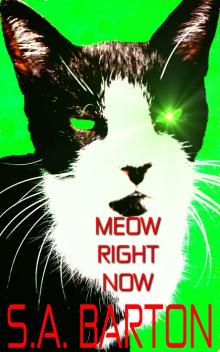 Meow Right Now
Meow Right Now I Pledge Allegiance
I Pledge Allegiance Visions Of Odd
Visions Of Odd Spoken Wood
Spoken Wood A Pornodroid's Tale
A Pornodroid's Tale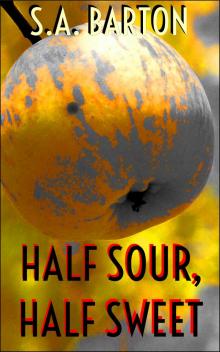 Half Sour, Half Sweet
Half Sour, Half Sweet